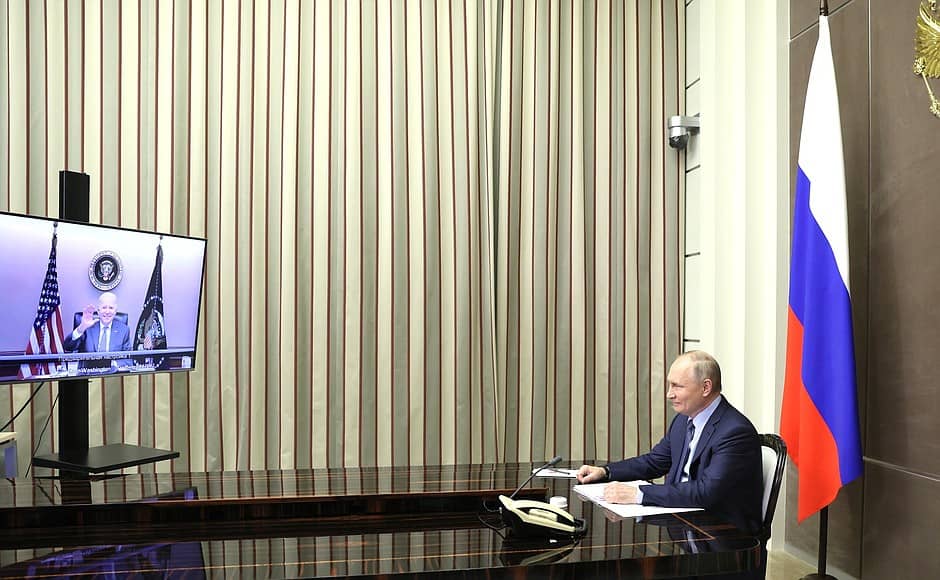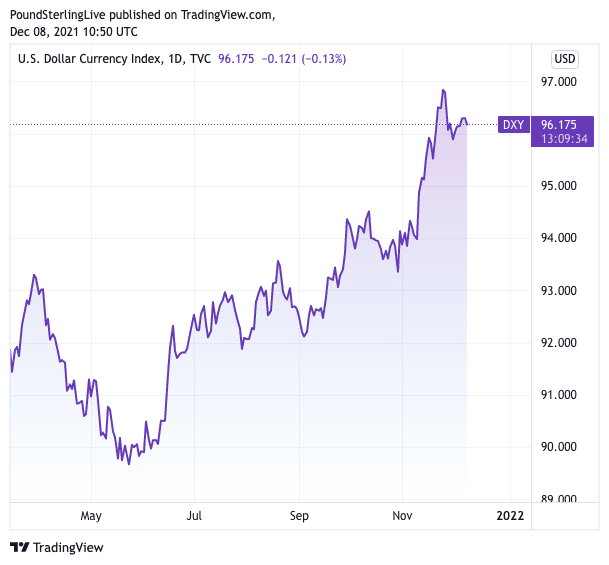Russia-Ukraine Flare-up Would be Supportive of the Dollar: Analysts
- Written by: Gary Howes

Image courtesy of kremlin.ru.
Has U.S. President Joe Biden done enough to convince Russian President Vladimir Putin that he should step back from heightening tensions on the Russia-Ukraine border?
The answer to this question could well determine whether a pressing geopolitical risk escalates into an all-out military invasion by Russia.
For the Dollar, such a development could provide substantive support in the new year according to analysts.
U.S. President Joe Biden told Russian President Vladimir Putin in a video conference call on Tuesday that Russia and its banks could be hit with the toughest economic sanctions yet if it invades Ukraine.
In a statement following the meeting Putin's office confirmed Biden had addressed, "movements of Russian troops near the Ukrainian border and outlined the sanctions the United States and its allies would be ready to impose should the situation escalate any further." Biden was said to have referred to the movements as "threatening".
Putin in turn, "warned against shifting the responsibility on Russia, since it was NATO that was undertaking dangerous attempts to gain a foothold on Ukrainian territory".
The U.S. is said to be putting pressure on Germany to block Russia’s Nord Stream 2 gas pipeline as part of a package of sanctions that would be implemented in the event of an invasion.
"The geopolitical landscape will be uncertain and unpredictable in 2022. Some of the risks include a possible Russian invasion of Ukraine," says Philip Wee, Senior Currency Economist at DBS Bank.
Above: The USD index - a measure of broad dollar performance - has been rising for much of 2021.
- GBP/USD reference rates at publication:
Spot: 1.3210 - High street bank rates (indicative band): 1.2850-1.2940
- Payment specialist rates (indicative band): 1.3090-1.3145
- Find out about specialist rates, here
- Set up an exchange rate alert, here
- Book your ideal rate, here
The Biden call with Putin comes amidst rising tensions over the buildup of Russian military assets on the Ukrainian border.
The developments are an emerging source of geopolitical concern for forward-looking investors: although judging by the return of euphoric sentiment on December 07 the issue is yet to become mainstream.
But, analysts are taking note.
"The CHF is not weaker," says Daragh Maher, Head of FX Strategy, U.S., at HSBC. "Perhaps the CHF’s European postcode makes it more attuned to growing geopolitical tensions between US/Europe and Russia over Ukraine."
Citi analyst Valery Berenshtein says although she initially believed it would be unlikely for Russia to act on Ukraine, she now believes these developments give room for concern.
There are now close to 90K Russian troops massing along the Russia-Ukraine border, as well as tanks and artillery.
U.S. military intelligence officials have reportedly told President Biden that there is the potential for 175K Russian troops to be involved in an invasion of Ukraine
"The Russian plans call for a military offensive against Ukraine as soon as early 2022 with a scale of forces twice what we saw this past spring during Russia’s snap exercise near Ukraine’s borders," an administration official told the Washington Post.
"The plans involve extensive movement of 100 battalion tactical groups with an estimated 175K personnel, along with armour, artillery and equipment," the official said.
The intelligence officials briefed that an invasion could take place in early 2022, adding to the already growing list of headaches facing investors.
For the Dollar, a highly liquid beneficiary in times of deteriorating market sentiment, the development is supportive of potential upside.
"A reversal in the USD’s uptrend will be difficult to achieve without a healthy and synchronised global recovery," says Wee.
According to the analyst a global recovery will be unlikely given growing geopolitical risks in Eastern Europe, combined with China’s slowing economy and the unwelcome emergence of the contagious Omicron Covid-19 variant risks.
DBS expects it will only be in 2023 when the U.S. Dollar depreciates as U.S. GDP growth turns more benign below 3%.
"Although we expect the USD to be stronger a year from today, the ascent will be bumpier compared to 2021," says Wee.
Following the meeting between Putin and Biden the Kremlin said "Russia and the United States will continue their dialogue and the necessary contacts."
"As long as the top politicians from Russia and the US are speaking with each other, we see only a relatively small risk of a Russian invasion and/or of the imposition by the US administration of sanctions on Russia," says analyst Nimrod Mevorach at Credit Suisse.





